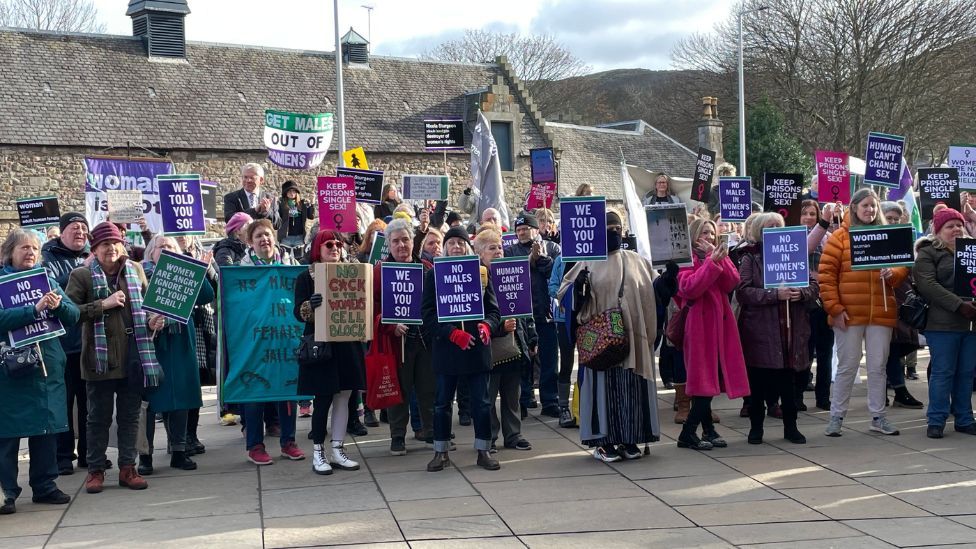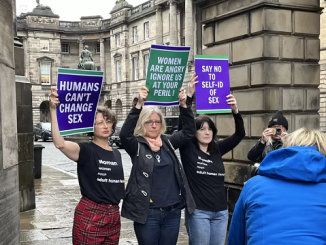
Trans women who have hurt or threatened women or girls will not be held in female prisons unless there are “exceptional” circumstances, new guidance states.
The Scottish Prison Service (SPS) policy follows a public outcry after a rapist was sent to a women’s prison.
Isla Bryson raped two women while known as Adam Graham.
The Scottish Conservatives said the new policy was “subjective” and “unacceptable”.
The latest figures show there were 23 trans prisoners in Scotland from January to March this year.
They included 19 trans women, seven of whom were in a women’s prison, and four trans men – one of whom was in a male prison.
Under previous guidance drawn up in 2014, the prison service allowed prisoners to be placed in facilities matching their gender identity, rather than their sex at birth, providing accommodation that “best suits the person in custody’s needs”.
This was reviewed and in February, following the Bryson case, it was updated to say no newly convicted or remanded transgender prisoner with a history of violence against women would be housed in female prison facilities.
Under the new policy – which will come into force in February 2024 – a trans woman would not be allowed to move into the female estate if they had been convicted of, or were on remand awaiting trial for, a crime that harmed a female – unless there was “compelling evidence that they did not present an unacceptable risk of harm to those in the women’s prison”.
These offences include any that result in suffering to a female, such as sexual offences, murder, assault, abduction and intimidation.
Those who have changed their legal gender can also be housed in accordance with their sex at birth, “if it is considered necessary to support people’s safety and wellbeing”.
The policy states: “Only when staff have enough information to reach a decision that a trans individual can be safely accommodated will they be placed in an establishment which matches their affirmed gender.”
Trans men will be admitted to the female estate, but those who have committed crimes against women may be kept separate from other prisoners if it is “deemed necessary” to “keep women in custody safe”.
The new guidelines also allow officers to search inmates regardless of the inmate’s “affirmed gender” or sex assigned at birth, “if it is necessary to keep the individual or staff safe”.
‘Risks carefully managed’
Teresa Medhurst, chief executive of the Scottish Prison Service, said if a trans woman’s offences were historic and low level, they could be moved to the female estate, but she stressed that would be exceptional.
She said all prisoners were “treated with dignity and respect, with their rights upheld, and any risks carefully managed”.
“The position, whilst it is still individualised, will ensure that those that have a history of violence against women and girls and present a risk to women will no longer be placed on admission in the women’s estate.
“I am content that everyone who is a transgender individual is located in the prison which best suits their risk and needs profile.”
She added that she was confident the new policy would address public concerns surrounding trans prisoners.

The Scottish government’s Justice Secretary Angela Constance said the new policy protected the “safety and welfare” of staff and prisoners, and the “rights of transgender people”.
She said: “SPS has considerable expertise, as well as a duty of care for the management of people in their custody, and this policy upholds its responsibilities to deliver safe, secure and suitable services for all.”
Scottish Conservative justice spokesman Russell Findlay MSP said the new prison policy was “unacceptable” and put women at “even greater risk by further eroding their fundamental right to single-sex space”.
“They say that male prisoners with a history of violence against women or girls should be allowed in the female estate and will only be blocked if they present a risk, which is completely subjective.”
Lucy Hunter Blackman, from policy analysts Murray Blackburn Mackenzie, said any new policy in Scotland should not “talk narrowly about the potential risk of a physical or sexual assault”.
She added: “It needs to recognise how the presence of someone male might impact upon group of vulnerable traumatised women, held in spaces from which they cannot escape.”
Source: bbc.co.uk






Be the first to comment